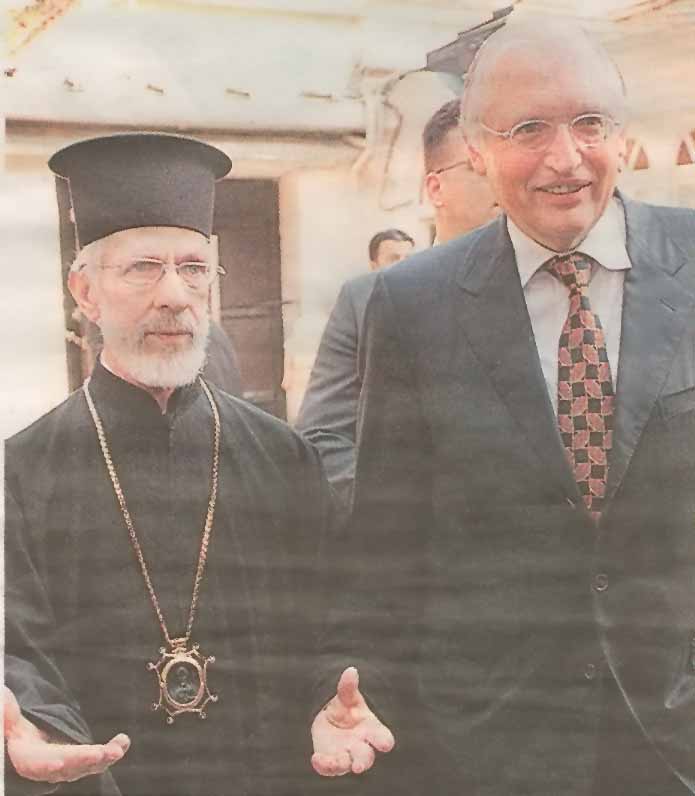 |
||
|
Turkey Violates Religious Rights Athens News |
||
|
When Ecumenical Patriarch Vartholomeos speaks out against Turkey's violations of religious and minority rights, the United States and European Union listen. In reports released back-to-back, the State Department and European Commission raked Ankara over the coals for continuing expropriation of the church properties of Istanbul's dwindling, 2,500 member Greek Ortfiodox community. |
||
|
But in Ankara such admonitions continue to fall on deaf ears, and Turkish government officials have not breathed a word of criticism against the recent campaign by the ultranationalists Grey Wolves to evict the Ecumenical Patriarchate from Turkey. |
 Greek Orthodox Metropolitan Meliton of Philadelphia escorts former EU commissioner Guenther Verheugen during his visit to the Ecumenical Patriarchate in Istanbul on 9 September 2004 |
|
|
"Minority religious foundations, through a I number of explicit or covert laws, court rulingsand administrative acts,}uffer the systematic confiscation of their real-estate property on various pretexts, such as there having been no member activity or effective administration, or any right to acquire landed property. In this manner they have come under the administration and economic management of the General Directorate of Vakifs, which substantially means that they have been confiscated. Speaking only of Baloukli, the Greek minority hospital, more than 400 pieces of property have already' been seized. Furthermore, this directorate has been put in charge of six foundations, six monasteries along with their property, three lay schools (of Agios , Therapon, Edimekapu and Evangelistria), one orphanage, 24 cemeteries, and two churches, along with their extensive property.
We are not in a position to know the number of confiscated real-estate holdings that remain under Vakif General Directorate administration, or how many have already been sold to third parties," Meliton says Of 1,700 petitions submitted to the Vakiflar to recognise Greek Orthodox foundations' ownership of properties, only 391 were accepted, Meliton notes. "The legislation does not allow the communities to reclaim the hundreds of "properties... expropriated by the state over the years," the US report states, noting that "ownership of properties registered under names of third parties, including the names of saints or archangels (eg a church)" is not recognised. The patriarchate has filed suit against Turkey at the European Court of Human Rights over the confiscation of the only property owned directly by the patriarchate, the huge property on Prinkipos island which hosts a decrepit orphanage. Exploiting the fact that the property in 1936 was erroneously registered in the cadastre as belonging to the orphanage (which was only a tenant on the property), a Turkish court recently seized the land on the grounds that the orphanage foundation is now defunct. '''Thus, it was confiscated without compensation to the owner, who based on a 1902 Sultan's Firman [recognising title] is the Ecumenical Patriarchate. The court wrongly accepted the erroneous 1936 registration as meaning the orphanage possesses title to the property," Meliton says. Subsequent efforts to bring Turkey's foundations law in line with European norms fell short of EU demands, as the European Commission's November 9 report notes. "The legislator's actual underlying intention was to secure the confiscation of stilI more minority property, on the pretext that full documentation had not been submitted by deadline." Both the US and EU reports on Turkey bemoan Ankara's refusal to reopen the patriarchate's Halki seminary, shut down by the state in 1971. "State authorities are invoking constitutional or legal obstacles, though according to a number of eminent and authoritative jurists in Turkey the objections are groundless. The Treaty of Lausanne expressly recognises the minority's right to maintain its educational institutions at its own cost, and obligates the Turkish government not to take any measures contrary to its obligations. It is adding insult to injury on the part of those who caused most of our minority desperately to flee the homeland of our ancestors by their harsh measures when they allege the minority's reduced numbers as their reason for not reopening the school. The small number of those expected to teach and attend in the initial period after the school has reopened does not give grounds for the Turkish government's refusal to reopen it. On the contrary, due to the small number of its students, the school's influence in Turkey wiII correspondingly be only a very minor one," Meliton underlines. |
||
HCS readers can view other excellent articles by the Athens News writers and staff in many sections of our extensive, permanent archives, especially our News & Issues, Travel in Greece, Business, and Food, Recipes & Garden sections at the URL http://www.helleniccomserve.com./contents.html
All articles of Athens News appearing on HCS have been reprinted with permission. |
||
 |
||
|
|
||
|
2000 © Hellenic Communication Service, L.L.C. All Rights Reserved. http://www.HellenicComServe.com |
||
